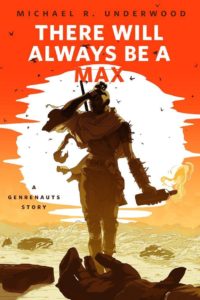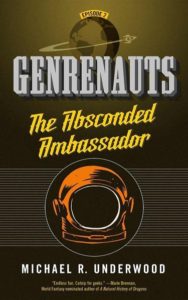 I’ve known about Michael’s work for some time. We interviewed him for the Dead Robot’s Society.
I’ve known about Michael’s work for some time. We interviewed him for the Dead Robot’s Society.
Synopsis: Leah Tang just died onstage. Well, not literally. Not yet. Leah’s stand-up career isn’t going well. But she understands the power of fiction, and when she’s offered employment with the mysterious Genrenauts Foundation, she soon discovers that literally dying onstage is a hazard of the job!
Her first assignment takes her to a Western world. When a cowboy tale slips off its rails and the outlaws start to win, it’s up to Leah – and the Genrenauts team – to nudge the story back on track and prevent a catastrophe on Earth. But the story’s hero isn’t interested in winning, and the safety of Earth hangs in the balance….
Production: Mary Robinette Kowal is the performer for this audio book. I say “performer” because she does a lot more than a straight read. Each character gets their own distinct voice, complete with accent. The efforts are consistent and it adds some nice depth to the piece. It’s always a little dodgy when a person attempts a voice where the character is a different gender from the performer. Mary does a very good job with the male voices. I’m not a huge fan of one particular character’s voice, since it sounds more like she has a bad chest cold due to the low register. It doesn’t detract from the story, though.
Grade: A
Story: Before I get to reviewing the story in particular, I wanted to say a few words about the idea. The concept that story has a deep impact on the real world is evocative and dare I say true? While I don’t believe in other dimensions where these tropes live and breathe is a real thing, I want to. This is the kind of idea I as a writer wanted to have. This is the kind of series I’d love to write. Only one problem, Michael did it first, and I suspect did it better than I would have. His education in this matter shines through.
Having a team who injects themselves into stories to solve their problems and tame the ripples these problems cause in the real world is brilliant. It allows for commentary on the genre itself (as one character says, there haven’t been (m)any groundbreaking movies or books in the genre for decades and this makes me said), and it also lets him play with tropes many of us know and love.
Now, on to the story. I love westerns. While I haven’t read very many, I consumed movies in the genre in massive doses ever since I was a small child. When I saw Michael’s first genre out of the gate was a Western, I was intrigued. I was not disappointed. The story uses many of the tropes and characters I love, and it puts a new spin on some of them. Since each of the genrenauts has to inhabit the body of a character in the story world, there’s a great fish out of water element. Leah becomes the young cowboy “Lee”, so not only must she play a part she’s not familiar with, she also has to become someone of a different gender and race.
Most of the conflict comes from finding out where the story is broken. The mystery elements are strong and the solution is satisfying. There’s some real teamwork on display and we also get to see Leah find her place on it. Everything is tied up fairly neatly by the end, just as it would if this were an episode of a TV show (which is sort of the point as I understand this series).
The world outside of the genrenauts, the one inhabited by Leah and her crew is interesting and it’s inhabited by a diverse cast. They have to keep the existence of this organization and the identity of its members a secret. If word got out that there were multiple dimensions, much less that there was a group who could travel to and from them and did so in an effort to save the world, chaos would ensue. The stakes are high, as a result. It means Leah will need to keep her public and private escapades separate, so there’s a super hero vibe to it. I would like to see more conflict as those worlds rub up against one another.
if I have a complaint, it’s a small one. Something about the whole story feels a little too “perfect”. Leah gets a phenomenal job with amazing pay and cool people. Yes, there’s an element of danger. People get hurt. But, she’s literally a chosen one who has the right skill set to get the job done. Of course, I suppose these elements are also a commentary of sorts on the tropes in question. I’d like to see more conflict or a little more mistrust coming from Leah. After all, the entire experience she has should cause a massive upheaval in her world view and in her life. Now, having said that, this is a novella and Michael is faced with the challenge of telling not just one story, but effectively two in tight confines.
Grade: A-
Verdict: I enjoyed “The Shootout Solution” a great deal. Everything from the concept to the execution is well done. The characters are a little thing in some cases, but Leah feels like a fully fleshed out person. The audio was a great listen, though in the future I’ll probably stick to reading the e-books. I highly recommend you have a look at this book and I will definitely be picking up book two.
Grade: A





